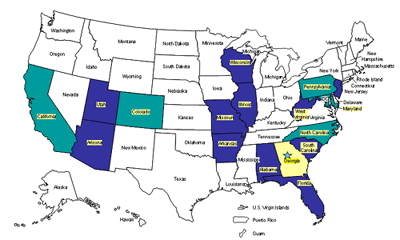 |
|
Autism Information Center |

 ADDM Network
(blue
states):
Alabama
(PDF),
Arizona (PDF),
Colorado (PDF),
Florida (PDF),
Georgia/CDC
(PDF),
Maryland (PDF),
Missouri
(PDF),
North Carolina (PDF),
Pennsylvania (PDF),
South
Carolina (PDF),
Wisconsin
(PDF) ADDM Network
(blue
states):
Alabama
(PDF),
Arizona (PDF),
Colorado (PDF),
Florida (PDF),
Georgia/CDC
(PDF),
Maryland (PDF),
Missouri
(PDF),
North Carolina (PDF),
Pennsylvania (PDF),
South
Carolina (PDF),
Wisconsin
(PDF)
 CADDRE
(green
states): California (California
Department of Health Services),
Colorado (Colorado
Department of Public Health and Environment),
Georgia/CDC, Maryland (Johns Hopkins University), North Carolina,
Pennsylvania
(University of Pennsylvania / The Children's Hospital of Philadelphia) CADDRE
(green
states): California (California
Department of Health Services),
Colorado (Colorado
Department of Public Health and Environment),
Georgia/CDC, Maryland (Johns Hopkins University), North Carolina,
Pennsylvania
(University of Pennsylvania / The Children's Hospital of Philadelphia)
CDC funds projects on autism spectrum
disorders (ASDs) in several states. These projects track the number of children who have an ASD, conduct studies to find out what factors make it
more likely that a child will have an ASD, and offer education and outreach
programs for researchers, families, and other people affected by ASD. Current state activities
include:
ADDM Network: Autism and
Developmental Disabilities Monitoring Network
CDC funds ten ADDM Network projects.
These projects are developing or improving programs to
track the number of children with ASDs in their states. The goal of
the ADDM Network is to provide comparable, population-based estimates of
the prevalence rates of autism and related disorders in different sites over time.
The following states are part of the ADDM
Network. Please click on a state to learn more about its ASD
monitoring activities.
ADDM Network
Alabama
(PDF),
Arizona (PDF),
Colorado (PDF),
Florida (PDF),
Georgia/CDC
(PDF),
Maryland (PDF),
Missouri
(PDF),
North Carolina (PDF),
Pennsylvania (PDF),
South
Carolina (PDF),
Wisconsin
(PDF)
[Return to top of page]
CADDRE: Centers for Autism and Developmental Disabilities Research
and Epidemiology
The Children’s Health Act of 2000
directed CDC to establish regional centers of excellence for ASD and
other developmental disabilities. These centers make up the Centers
for Autism and Developmental Disabilities Research and Epidemiology
(CADDRE) Network. The CADDRE Network is currently working on the
National CADDRE Study: Child Development and Autism – a five-year,
multi-site collaborative study to help identify factors that may put
children at risk for autism spectrum disorders (ASDs).
Current CADDRE Project
Study to Explore Early Development (SEED) – a
five-year, multi-site collaborative study to help identify factors
that may put children at risk for autism spectrum disorders (ASDs).
more
...
Previous CADDRE Network
Activities
Goals of the previous CADDRE project
-
Work with the ADDM Network to
monitor the number of children with ASDs and other developmental
disabilities.
-
Improve community and service
provider awareness of ASDs and other developmental disabilities,
or improve access of children with ASDs and other developmental
disabilities to comprehensive, community-based, family-centered
care.
-
Conduct epidemiologic research
related to ASDs and other developmental disabilities.
These studies addressed topics such as what factors
(genetic, environment, and others) make it more likely that a
child will have an ASD, what other disabilities children with
ASDs have, biomarkers, and the economic costs of ASDs.
CADDRE Programs
CDC funds the following CADDRE
programs. Please click on a program to learn more about its
activities.
[Return to top of page]
Community-Based
Autism Spectrum Disorders Outreach and Education Projects
CDC funds SAFE, Inc., in Pennsylvania, to
enhance their community-based ASD outreach and educational activities to
help people with ASD to live a full and independent life.
SAFE
Fact Sheet (PDF)
The Christian Sarkine Autism Treatment
Center (CSATC) and Clarian Health Partners at Riley Hospital for Children
have joined together to develop the HANDS in Autism (Helping Answer Needs
by Developing Specialists in Autism) Program through a grant provided by
the Centers for Disease Control and Prevention (CDC).
Sarkine Fact Sheet (PDF)
[Return to top of page]
Date:
August 27, 2007
Content source: National Center on Birth Defects and Developmental
Disabilities
|
 |
|